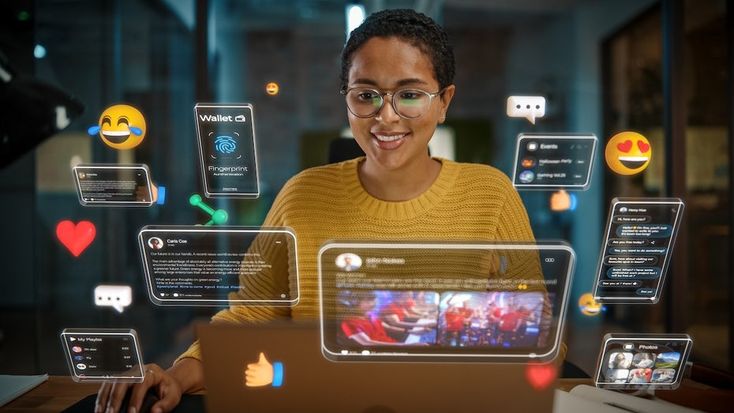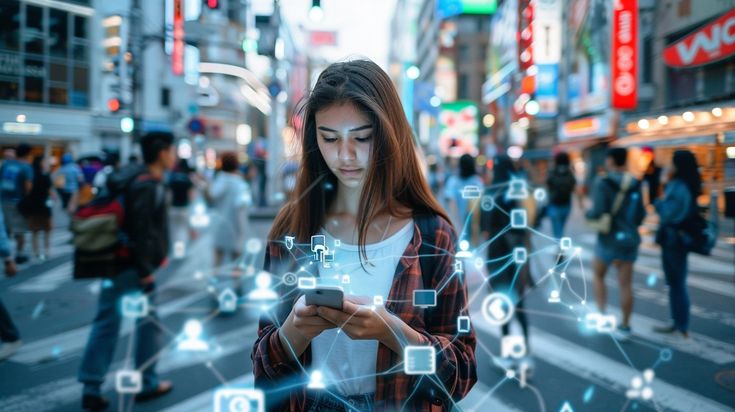As the digital world becomes increasingly connected and competitive, personalization has emerged as a key differentiator for businesses, especially in the mobile app space. Users are no longer content with one-size-fits-all marketing messages or generic app experiences. To meet these rising expectations, companies are turning to Artificial Intelligence (AI) to create more personalized, relevant, and engaging app marketing strategies.
AI is revolutionizing the way apps interact with users, creating dynamic, tailored experiences that not only drive higher engagement but also improve user retention, increase conversions, and foster brand loyalty. By leveraging AI, app marketers can go beyond traditional segmentation and create hyper-targeted campaigns that speak to the unique needs and behaviors of individual users.
This article delves into how AI plays a crucial role in personalizing app marketing strategies in 2025, and how it can be harnessed to improve user acquisition, engagement, retention, and overall app success.
1. AI-Driven Data Collection and User Segmentation
At the core of AI’s power in app marketing is its ability to collect and analyze vast amounts of user data in real-time. Traditional segmentation methods often rely on broad demographics, such as age, gender, and location, which can be limiting in terms of personalizing marketing efforts. AI, on the other hand, leverages advanced data analytics to create more granular user segments based on behavior, preferences, and interactions within the app.
AI-Powered User Segmentation:
- Behavioral Segmentation: AI algorithms track user activity within the app, such as which features they use most often, how often they log in, and their time spent on certain pages. This data can be used to group users into segments based on their behavior, allowing marketers to deliver highly relevant content.
- Predictive Analytics: AI can predict future behavior based on historical data, such as which users are likely to churn or make a purchase. Marketers can use this information to create personalized retention strategies that are tailored to the likelihood of a specific user returning to the app.
- Personalized Content Delivery: With AI’s ability to recognize patterns in user behavior, app marketers can deliver personalized content that resonates with individual users. For example, recommending specific in-app features, services, or products based on past interactions increases the chances of conversion.
2. Personalized In-App Experiences
The heart of app personalization lies in creating an experience that feels tailor-made for each user. AI enables app developers to design dynamic, personalized interfaces and user journeys that adapt based on individual preferences, behaviors, and actions.
How AI Enhances In-App Personalization:
- Dynamic User Interfaces: AI algorithms can modify the app’s interface based on user preferences. For example, the layout, themes, and even the colors of the app can be adjusted automatically to match a user’s visual preferences, creating a more engaging experience.
- Content Personalization: AI-powered recommendation engines analyze users’ past behavior, search patterns, and interactions to suggest content that is most relevant to them. For example, in a shopping app, AI can recommend products based on a user’s browsing history or purchase patterns.
- Contextual Relevance: AI also enables context-aware personalization. If a user has just completed a task or interacted with a certain feature, the app can use this information to offer follow-up suggestions, promotions, or next steps that feel natural and timely.
3. AI-Powered Push Notifications and Messaging
Push notifications remain one of the most effective ways to engage users and drive retention. However, sending generic notifications can quickly lead to user fatigue and high opt-out rates. AI enables push notifications and in-app messages to be personalized in real-time, based on a user’s behavior, location, and preferences.
Smart Push Notifications with AI:
- Behavioral Triggers: AI algorithms can track specific user actions, such as abandoning a cart, failing to complete a task, or not using the app for a while. These behavioral triggers prompt AI to send personalized notifications that encourage users to take action, whether it’s completing a purchase or exploring new features.
- Optimal Timing: AI can analyze historical data to determine the best time to send notifications. By learning when a user is most likely to engage with a message, AI ensures that notifications reach the user at the optimal moment, increasing the chances of a response.
- Personalized Offers: Push notifications can be tailored based on the individual’s preferences. For example, AI can send personalized discounts or offers based on a user’s purchasing habits or browsing history. This creates a sense of value and urgency, which drives higher conversion rates.
4. Chatbots and Conversational AI for Enhanced User Engagement
Customer service and support play an essential role in keeping users satisfied and engaged with an app. Traditional customer service systems, such as email or phone support, often lack the immediacy and personalization that users expect today. AI-powered chatbots and conversational AI tools are transforming the way apps interact with users, providing real-time, personalized assistance.
AI-Powered Chatbots:
- 24/7 Support: AI chatbots are always available, providing users with instant answers to their questions or concerns. This level of accessibility leads to a better user experience and helps retain users who might otherwise abandon an app due to frustration.
- Personalized Assistance: AI chatbots use user data to offer personalized recommendations, guidance, and troubleshooting. For example, if a user is having trouble with a particular feature, the chatbot can offer tailored instructions or suggest relevant content based on their preferences and usage patterns.
- Seamless Integration: AI chatbots can be integrated with multiple communication channels, such as in-app messaging, email, and even social media, creating a cohesive and personalized experience across all touchpoints.
5. AI for Predictive and Automated Marketing Campaigns
AI’s ability to process vast amounts of data and recognize patterns in user behavior allows app marketers to optimize campaigns and anticipate user needs. By using AI to analyze user data, marketers can forecast which users are likely to convert, engage, or churn, and automate marketing efforts accordingly.
Automated Campaigns with AI:
- Predictive Targeting: AI can analyze user behavior to predict which users are most likely to engage with specific types of content or take certain actions. By targeting these users with personalized campaigns, marketers can increase the likelihood of conversions and drive user engagement.
- Automated Personalization: AI can automatically adjust marketing messages and ads based on real-time data, such as user interactions, location, and browsing habits. This ensures that users are always receiving the most relevant and timely content, without requiring manual intervention from marketers.
- A/B Testing and Optimization: AI can optimize marketing campaigns by running A/B tests in real-time and analyzing which strategies work best for different user segments. This iterative approach helps marketers refine their campaigns and achieve higher conversion rates.
6. Leveraging AI for App Store Optimization (ASO)
App Store Optimization (ASO) is crucial for ensuring that your app ranks well in the app stores and is discoverable by users. AI can significantly enhance ASO by analyzing app performance, user reviews, and competitor data to optimize keywords, descriptions, and other elements that influence app rankings.
AI-Enhanced ASO Techniques:
- Keyword Optimization: AI tools can analyze search trends and suggest the most relevant keywords for your app’s listing. This allows you to optimize your app’s title, description, and metadata for maximum discoverability.
- App Review Sentiment Analysis: AI can analyze user reviews to identify common pain points and areas for improvement. Marketers can use this information to address user concerns and enhance the app’s features, ultimately improving ratings and increasing visibility in the app stores.
- Competitor Analysis: AI can track competitor apps and analyze their strategies to uncover opportunities for improving your app’s ASO. By examining factors like keyword rankings, user ratings, and feature sets, AI can suggest adjustments to help your app stand out in the crowded app store.
7. AI for Optimizing User Retention and Engagement
One of the most significant challenges for app marketers is retaining users over time. AI is playing an increasingly vital role in user retention strategies by providing insights into user behavior and suggesting personalized ways to engage and retain users.
AI-Powered Retention Strategies:
- Churn Prediction: AI can predict which users are at risk of abandoning the app based on their usage patterns. By identifying these users early, app marketers can take proactive steps, such as sending personalized offers or re-engagement notifications, to retain them.
- Personalized Incentives: AI can suggest personalized rewards, discounts, or promotions based on user behavior, such as frequency of use, purchase history, or content preferences. These personalized incentives can increase user loyalty and reduce churn.
- User Behavior Analysis: By tracking user interactions with the app, AI can identify which features or content users engage with most, allowing marketers to double down on those areas and create new experiences that resonate with users.
Conclusion
As we move into 2025, AI is becoming an indispensable tool for personalizing app marketing strategies. From improving user segmentation and providing dynamic in-app experiences to automating marketing campaigns and enhancing app store optimization, AI is helping marketers create highly tailored, relevant, and engaging experiences for users.
By leveraging AI, app marketers can not only enhance the personalization of their campaigns but also drive better user acquisition, engagement, retention, and conversion rates. As user expectations continue to evolve, adopting AI-powered tools and strategies will become a critical factor in staying competitive in the ever-changing app landscape. Embracing AI is no longer optional—it’s a necessity for app marketers looking to succeed in 2025 and beyond.



